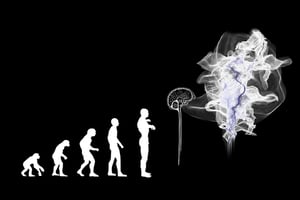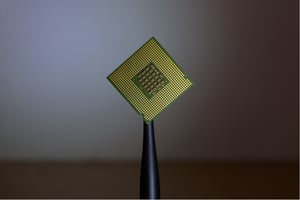Human/Machine hybrids (Cyborgs) are already here. Surgeries are performed every day, replacing worn...
The Cyborg Epoch: What Does It Mean to Be Human?
We are living in the Cyborg Epoch. What does that mean for humanity? We are already beginning to augment our bodies with technology. As computer connections to the brain and machines become more sophisticated, the line between human and machine becomes blurred. The ability to directly control machines with thought has made creating a fully functioning cyborg a real possibility. At what point does a human stop being human? Is it by percentage? Or maybe it is by conscious awareness? How will we define humanity in the future?
Humans have been augmenting their bodies with technology for thousands of years. It started with simple alterations such as glasses to help aging eyes see and crutches to help improve mobility when a leg is injured, but it didn't stop there.
As technology has developed, we can now alter and even augment our bodies. The augmentations have taken on a new level of complexity. Today, we can create replacements for body parts and connect them directly to the brain. The first full-scale testing of mentally controlled mechanical arms and legs is already taking place with individuals who are paraplegic or who have lost one or more limbs. It is no longer a question of if the technology will work. It is just a matter of time before all bugs are worked out, and the technology will evolve and become widely available.
The question is, what happens when otherwise healthy people choose to replace multiple body parts with mechanical parts to gain advantages such as super strength, speed, or vision? When do they stop being human and are considered a completely different species?
It may seem far-fetched that anyone would willingly choose to drastically alter their body, but as we have seen with plastic surgery and surgical implants, there is already a multi-billion dollar industry around people who are willing to alter their bodies to meet the current fad in beauty. It seems that by adding to the benefits of body augmentation that more people would choose to do it.
How many people will be willing to alter themselves to gain the ability to jump to the top of a three-story building in a single bound? Or to be able to pick up a car like Superman? There seems possible to enhance nearly everything that is currently part of the human experience.
The ethical and moral implications of this technology are staggering. If a person with a mechanical arm can lift twice the weight of a person with a regular arm, are they allowed to compete in weight lifting competitions? What if they can run twice as fast? What if they can process information faster than a normal human brain?
It could create an entirely different type of sports competition. Governing bodies currently restrict the use of performance-enhancing drugs, and it follows that they would restrict performance-enhancing augmentations, but there could be a new category of enhanced competitions.
There are no easy answers to these questions. But as we move into the Cyborg Epoch, we will need to grapple with them. Because the reality is this technology is coming whether we like it or not. We need to be prepared for the impact it will have on humanity.
What exactly is a cyborg? To answer that, we need to first understand what characteristics define this new species.
Cyborgs are created when organic life forms are integrated with technology. This can be done in a number of ways, such as installing artificial limbs or organs or embedding chips or potentially nanobots into the body. As a result, cyborgs have enhanced physical or mental faculties.
While the concept of cyborgs has been around for centuries, it was popularized in the 20th century in science fiction novels, films, and comic books. There are countless films today of both superheroes and villains fighting for dominance in the world. Today, cyborgs are no longer just a figment of our imagination – they're becoming increasingly more complex and common.
As we mentioned before, the military is already experimenting with exoskeletons for soldiers to help them move faster and carry large loads over extended distances, and an army of cyborgs with advanced physical traits seems like an obvious next step. But where does it stop, and how far do we as a society allow it to go?
There are also ethical considerations to be made when it comes to cyborgs. As they become more and more common, there will likely be a debate about what defines a person and where the line is between human and machine.
We're already seeing this happen with the development of artificial intelligence (AI). Scientists are divided on whether or not AI should be given the same legal rights as humans. Some argue that AI is merely a tool created by humans and does not deserve the same protections, while others believe that AI will surpass human intelligence in many ways and, therefore, should be treated as its own entity.
This debate will only become more prevalent as cyborg technology advances, and we begin to see people with enhanced abilities due to their implants.
We will need to ask ourselves: at what point does a human stop being human? Is it by percentage? How will we define humanity in the future?
While cyborgs may still be in their infancy, they are becoming more prevalent in society.
This raises a number of moral and ethical questions that we must consider as a species. What does it mean to be human? How far should we allow cyborgs to progress? These are important questions that need to be answered if we want to avoid any negative consequences from the increasing use of cyborg technology.
What do you think about cyborgs? Are they something you would be interested in or scared of?
Let us know in the comments below! And be sure to check back for more posts on all things related to the Cyborg Epoch. Thanks for reading!



